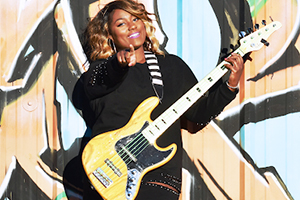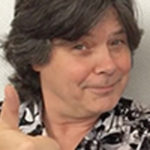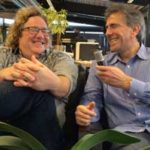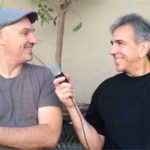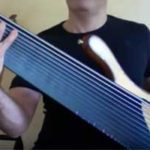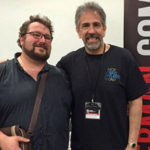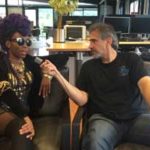From musical prodigy to in-demand “soul groover” and up-and-coming solo artist, here is Téja’s story
Exclusive interview with FBPO’s Jon Liebman
April 23, 2018
Photo(s) by Lisa Wilder/LDub Photo
Téja Veal discovered her love of the low end in middle school, where she played double bass in the orchestra program before eventually picking up the electric bass. Beginning her professional career at 16, it didn’t take long for the Miami native to make a name for herself in the music world. Catapulted by her fluid playing and passion for “old school soul,” Téja has toured with a number of high-profile artists, including Frank McComb and Musiq Soulchild. Her current gig with Grammy-nominated singer/songwriter and producer Janelle Monáe has been keeping her busy, both at home and abroad. Now, with all her years of seasoning as a supporting band member, Téja is ready to add “solo artist” to her list of accolades. “I just want to make good, honest music – stuff that your ears will love and your heart will believe,” she says. Below is our one-on-one conversation with Téja, where she describes what led up to this stage of her career and where she plans to go next.
FBPO: Growing up in Miami, how were you first exposed to music and how did you become a bass player?
TV: Growing up, my dad really loved old school – soul and Motown, Earth Wind & Fire, Stevie Wonder… That’s kind of the way I would bond with my father, through music. And then in middle school, I had to choose an elective in the 6th grade, and I chose orchestra. It just piqued my interest. I was a tall kid and I saw the big bass. All the other girls were trying to play violin and I didn’t want to do what the other girls were doing. So I chose the bass and I fell in love with it; I fell in love with the tone. I started on upright and then, around 8th grade, the band teacher gave me a bass guitar, the school’s Fender. He said take it home and play around with it. We didn’t have any tubas, and he was like, “Well, can you play [the tuba parts] on bass?” So I just played with the marching band on bass guitar and I got recruited into this jazz program at the Performing & Digital Arts Center at Miami Northwestern Senior High School. I got tapped to come play at their spring concert when I was in 8th grade, sort of like a live audition into the program. I got accepted to that program, the performing arts program, and that’s really where I got my feet wet, I guess, as a bassist. And I started gigging at 16.
FBPO: It seems to me I read that there was some resistance from your teacher about a girl playing the bass. Is that true?
TV: I think a lot of girls were just fickle, and so with the bass, it was, “If you’re going to play this, you have to prove that you really want to play.” I didn’t think he realized I was serious about it [at first]. Unfortunately, he left after my 5th grade year. In 7th grade I had a teacher that wasn’t very encouraging at all, and that’s when I left the music program. Then in 8th grade, I started back in the band program, but by then I was kind of just teaching myself.
FBPO: Who were some of your bass influences? Did you have any bass heroes?
TV: Oh, yes! Definitely. I love James Jamerson. Oh my goodness. I love his approach. I like his melodic bass lines, the groove. To me, the core of every song, the Motown bass, is very important. Then Verdine White. I’ve loved Earth, Wind & Fire since I was in the 3rd grade. My dad introduced me to them. When I actually got to see [Verdine], to see how animated he is onstage, he seems to just be in love with the music and with playing. Earth, Wind & Fire’s music to me, they’re one of my favorites, like one of my top five groups of all time. And then Nathan Watts with Stevie Wonder. I’m really old school, I mean I really love the old school bass players a lot.
FBPO: How about when you were just playing upright bass in orchestra, before you played electric? Were you listening to any of the jazz players?
TV: At that time, no. It was just intro to orchestra. I really didn’t get much into jazz bass until I was accepted into the jazz program in high school. Ron Carter, Charles Mingus. I guess that’s when I started to learn more about jazz bass. Before, my only exposure to bass had been like soul.
FBPO: That must have opened up a whole new world for you.
TV: Yes. Yes, it did. And I like big band. I played in big band when I was in high school and I loved it. I still love big band. I don’t really get to do big band much any more, but I just feel like it really helped me to be kind of well rounded as a musician. Of course also, growing up in church, gospel [became] an important genre for me as well. I don’t know. I just believe it’s good to be well rounded. Even some rock bass. I just appreciated a good bass. I like to hear how bass is applied within a group. That’s always been my approach. Maybe because I was shy, too. I never really wanted to stand out too much. Like when you have to solo and everybody’s looking at you! [laughs]
FBPO: You mentioned you started gigging at 16. What kind of stuff were you doing back then?
TV: I would do little jazz gigs around town. My band director, Mr. Dorothy, would set up little combos. First we used to do stuff around the district, like school district functions, and because of that I got the eye of a local gentleman who had a little jazz club. My mom would chaperone me because I was definitely underage. I was very young to be working with such older gentlemen [laughs]. We would do local functions, like the debutante balls or, there was a little jazz café. I’d play there with them. MOCA, the Museum of Contemporary Art, would have a showcase and we’d play there. I got my first little amp when I was 16, my little Ampeg BA115, and I’d go gig! And I’d make money!
FBPO: How did you go from doing that to landing the Janelle Monáe gig?
TV: I started gigging by doing club gigs and playing in church and around town in college. Then I got my first big industry gig with an artist called Musiq Soulchild. He was based out of Philly at the time, and then he moved to Atlanta, and so I was in his touring band for 2009. The gig ended around Thanksgiving and I went back home and decided I wanted to move to Atlanta to become a full-time musician. So I moved to Atlanta in January 2010 and was gigging around town. In late December 2013, I got a phone call from a friend who was friends with Janelle’s MD at the time and I guess they were looking for me. So he passed my information and that’s how I got that gig. And it’s been great!
FBPO: How did your parents feel about your decision to become a full-time professional musician?
TV: I know my parents love and support me and they want me to be happy. I don’t come from a musical family, so it’s not, I guess, a lifestyle that any of us ever really anticipated or understand. I think it’s natural for parents to worry about your well-being, but my parents do support me following my dream.
FBPO: I’m sure the Janelle gig must be keeping you plenty busy. What else have you got going on?
TV: Well, I play full-time. I’ve also been working on some of my own music. I put out an EP last year, just a cover EP. I’m playing and singing. It was my first attempt to release music as a solo artist. This year, I’ll be looking to release original music. And then Janelle’s going to be going on tour soon. She’s releasing her latest album in April, so that should be fun. And then I just play around town and I’m just trying to stay busy.
 FBPO: Let’s talk a little bit about your gear. You play Schecter basses, right?
FBPO: Let’s talk a little bit about your gear. You play Schecter basses, right?
TV: Yes, I’m a new Schecter artist. I have the Diamond-J 5 Plus and the CV-5, and the Stiletto bass, which I just got.
FBPO: So you’re a 5-stringer!
TV: Yes, I am a 5-stringer! [laughs]
FBPO: Low B, I assume?
TV: Yes. The low B is everything! Especially in R&B music, it’s necessary.
FBPO: What is it about Schecter basses that you like so much?
TV: I really like the tone. I really feel like it’s not too bright, not too dark. I don’t like things to be too complicated or overly technical. I can balance it or do whatever I need to do very quickly and efficiently. I really like, aesthetically, the design of the basses. To me, they look classic; they’re interesting. The Schecter Stiletto bass is all one piece. It’s a really beautiful bass. It’s really lightweight. On a gig like Janelle’s gig, I have to do a lot of moving and jumping up and down and the Stiletto bass is perfect for that. It’s not too heavy and the tone, active or passive [is] stellar. The Diamond-J 5 I have is a beautiful bass. It’s really, really pretty. I think the workmanship on each of the basses is well done. I think it’s a great price point for anyone, whether you’re a novice or a pro. They’re easy to play. They feel good in my hands. I haven’t changed anything on any of them. I haven’t changed pickups, pre-amps, nothing. Just stock, as they come. They sound great.
FBPO: What kind of strings do you play?
TV: DR. I use DR Neon, the Neon Green, in particular. Green is my favorite color and they look really cool on stage.
FBPO: How about amps?
TV: Recently, I just became an Ampeg artist, which has been full circle for me because, like I explained to you, my first amp was an Ampeg BA115. I still have it. I still use it.
FBPO: What about the future?
TV: In the future, I hope to put out my music. If I’m honest, I’ve been a little afraid to step out there and do it, but this is my year to accomplish that. I just want to make music that is honest and real and that people can relate to and just express myself. Hopefully I can find people that can relate and want to hear what I have to say. I eventually would want to make a tour as myself. I want to play in Paris. I don’t know why I feel drawn to Paris, but I would love to go to Paris and play a show. I really look up to people like Adam Blackstone. He’s a bass player, but now he’s an MD to the stars. I really admire everything that he’s doing. I would love to do something like that one day, just be an arranger and a producer and put people together, put groups together for award shows or for tours or whatever. It would be really nice to be a bass player [and] be the person in charge.
FBPO: What would you be if you weren’t a bass player?
TV: A chef. I love to cook and I really like to cook for people. It’s something I’ve been considering, going to culinary school to have another way to express myself. I really like to create.
Related posts:
[table id=1192 /]
